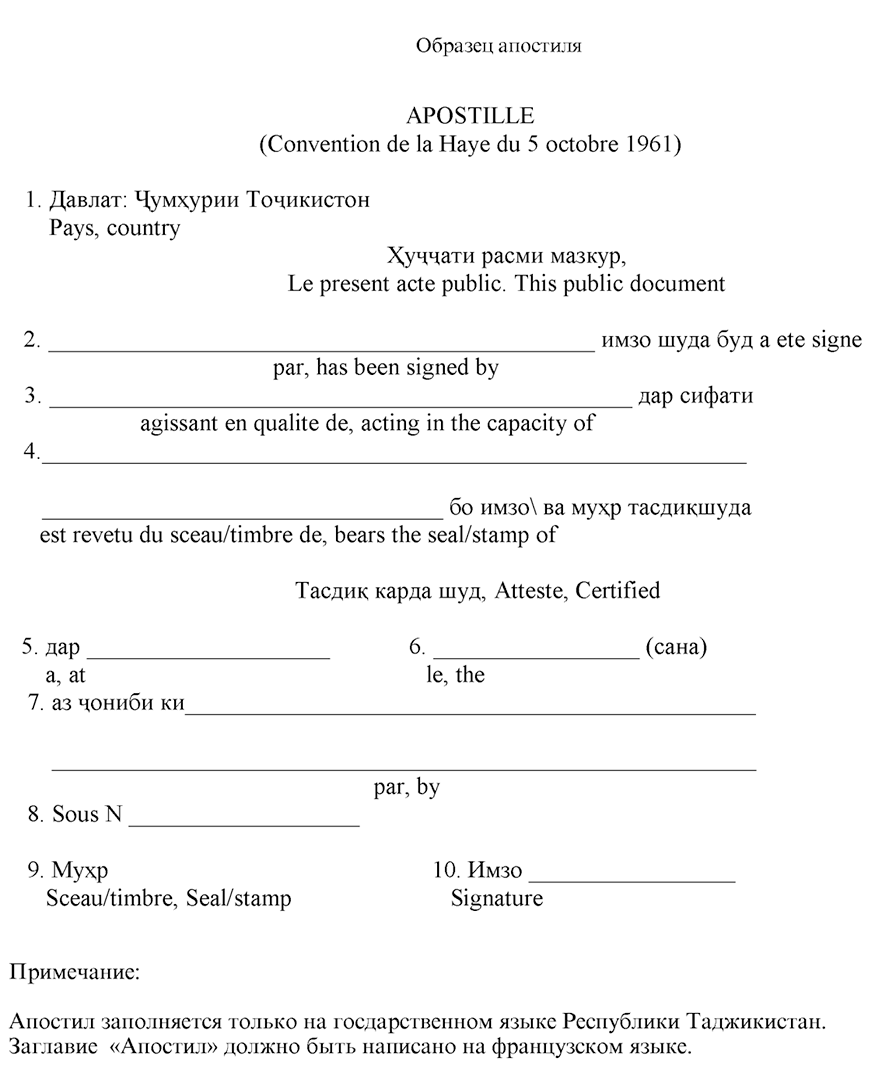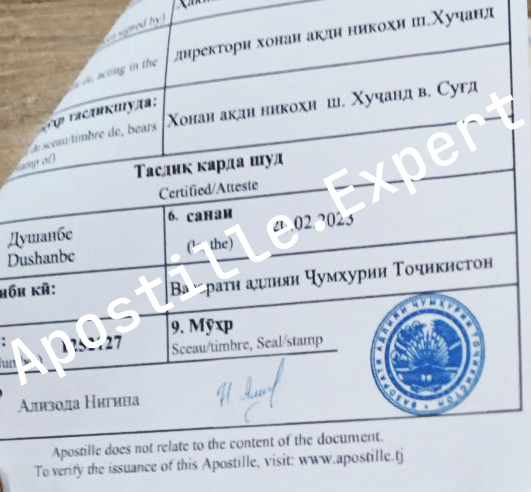Apostille Stamp in Tajikistan
What is a Tajik (Tajikistan) apostille?
Tajik apostille – is a special stamp, the form, content and purpose of which are determined by the Apostille Convention of 1961. The main language of the apostille is Tajik, which is accompanied by a translation into English, for excluding first and last names.
Tajikistan joined the Hague Apostille Convention February 20, 2015. The Apostillebecame effective from October 31, 2015. This means that documents received before November 2015 cannot be apostilled. Such documents for an apostille must be converted to documents of a new type.
The Convention has not entered into force with Austria, Belgium and Germany. It was the wish of these countries not to accept the Tajik apostille. Accordingly, the apostille of these countries is not accepted in Tajikistan. The apostille process for these countries in Tajikistan is replaced by consular legalization.
Apostille form in Tajikistan – source – official website of the apostille in Tajikistan:

Apostille in Georgia is affixed in two languages: Tajik and English, regardless of whether the document is translated or not.
What does a Tajik Apostille look like?
Photo of Tajik apostille:

Apostille – certifying the authenticity of the signature, seal or stamp of the original document by affixing an apostille. The affixing of an apostille is carried out by printing it out with the seal and signature of an official of the authorized body with the assignment of a uniquely generated number of the unified register of Apostilles.
Tajik apostille text
Текст таджикского апостиля
1. Давлат: Ҷумҳурии Тоҷикистон
Pays, country
Ҳуҷҷати расми мазкур,
Le present acte public. This public document
2. _____________________________________________ имзо шуда буд a ete signe
par, has been signed by
3. ________________________________________________ дар сифати
agissant en qualite de, acting in the capacity of
4.__________________________________________________________
_________________________________ бо имзо\ ва муҳр тасдиқшуда
est revetu du sceau/timbre de, bears the seal/stamp of
Тасдиқ карда шуд, Atteste, Certified
5. дар ____________________ 6. _________________ (сана)
a, at le, the
7.аз ҷониби ки_______________________________________________
__________________________________________________________
рақам par, by
8. Sous N ___________________
9. Муҳр 10. Имзо _________________
Sceau/timbre, Seal/stamp Signature
Эзоҳ:
Translation into English
(Hague Convention of October 5, 1961)
1. Country: Tajikistan
This official document
2. Signed: __________________ (by whom, last name, first name)
3. Acting as: _________________ (position)
4. Print:
Certified by seal
5. Place: _______________ (city)
6. Date: __________________
7. Organization: ______________________
(approx. BUSINESS LAWYERS SRL: Civil Service Development Agency of the Ministry of Justice of Tajikistan)
8. No. ____________________
9. Seal/stamp
(note BUSINESS LAWYERS SRL: Seal of the authority authorized to certify apostilles)
Why do you need an apostille if documents from Tajikistan already have a seal and signature official?
The fact is that a large staff of officials works in ministries and departments, government bodies, archives and registry offices of Tajikistan.
Officials change periodically. This means there are a lot of signatures and they also change. To ensure the originality and truthfulness of the document, and to avoid forgeries, you need to check whether the official’s signature matches the samples of his signature. And did he sign this document?
With so many documents and so many officials, it is very difficult to do this. This is especially difficult for those officials who accept your documents abroad.
That is why a system of confirming all signatures and seals by several persons arose – to facilitate the work of foreign officials. This also reduces processing times abroad as well as waiting times for applicants. In such a system, it is easier for local officials responsible for Apostille to check signatures, seals, and the documents themselves (their forms and contents).
Employees who have access to the internal database of signatures, seals and sample documents also end up in a special register with their signatures. But this register is limited to a dozen signatures, samples of which are transferred to other partner countries or are easily verified by them in other ways.
There are two proceduresfor such confirmation. The first procedure – the most reliable – is the legalization of documents. When the documents are signed by the issuing official, then the document is certified by an employee of the ministry (usually the Ministry of Foreign Affairs), then the last signature is checked and certified by the consul nationality of the country where you need to submit documents. Verification is carried out on the basis of the current database (list) of signatures – along a chain of three departments (institutions, government bodies).
Second procedure is based on greater trust and bypasses one department, usually the Ministry of Foreign Affairs. In this case we are talking about an apostille. Apostille is a special stamp of a standard form that greatly simplifies the procedure for recognizing documents from one state on the territory of another.
Why put an apostille if Tajik documents can be checked online?
Unfortunately, online document verification has not yet been established in Tajikistan. Online document verification systems are a new solution for checking the authenticity of documents. We can say that such systems are still in test mode.
When governments and society are ready for such a document verification system, most likely there will be no need for an apostille.
However, quite a lot of officials will have access to such a system. And this again raises the question of the large number of signatures and their relevance.
Is it possible to affix-an-apostille at the Consulate of Tajikistan?
According to the Hague Apostille Convention, the stamp Apostille for Tajik documents cannot be obtained at the Consulate of Tajikistan. And this does not depend on the country where the consulate is located, be it Ukraine, Italy, Germany, and so on.
Is there an electronic apostille in Tajikistan – E-apostille?
Electronic Apostille allows you to certify birth and marriage certificates, medical documents, court orders and other documents for use abroad. By launching this innovative electronic service, Tajikistan will become one of the leading countries in this direction. On the official website of Tajikistan there is a link to an electronic apostille. But electronic apostille does not work in Tajikistan.
The possibility of checking the apostille online is also stated. However, there is no such possibility yet. The electronic apostille registry is very relevant for combating fraud and abuse. Using the electronic apostille register, any interested person can check the apostille of a document visually and the scanned document.
How can I check the apostille?
The apostille is checked by the apostille number and the date of issue (the apostille has a unique number (in line number 8) and date of issue (in line number 6)). Such verification can be performed in the authorized bodies of Tajikistan.
Powers of judicial authorities regarding apostille
The Ministry of Justice of the Republic of Tajikistan affixes an apostille on official documents, civil registries, public notaries, judicial authorities, prosecutorial authorities and enforcement proceedings.
The procedure for organizing apostille is regulated by the regulations on uniform rules and conditions for affixing an apostille on official documents of government bodies of the Republic of Tajikistan, approved by the Government of the Republic of Tajikistan.
Refusal to affix an apostille in Tajikistan
Apostille of documents may be refused if:
- the document is intended for submission on the territory of a state that is not a party to the Convention or that has raised an objection to the accession of the Republic of Tajikistan to the Convention (Austria, Belgium, Germany);
- the document does not meet the requirements (if these are documents issued by diplomatic missions and consulates of the Republic of Tajikistan, commercial and customs documents, military ID, identity card, passport).
- presentation of an incomplete document package in;
- the signature of an official or the seal or stamp of public authorities of the Republic of Tajikistan and organizations on an official document do not correspond to the samples available in the authorized state body for affixing an apostille.
Refusal to affix an apostille must be provided in writing.
Complaints about refusal to affix an apostille by an authorized state body are considered in the manner established by the legislation of the Republic of Tajikistan.